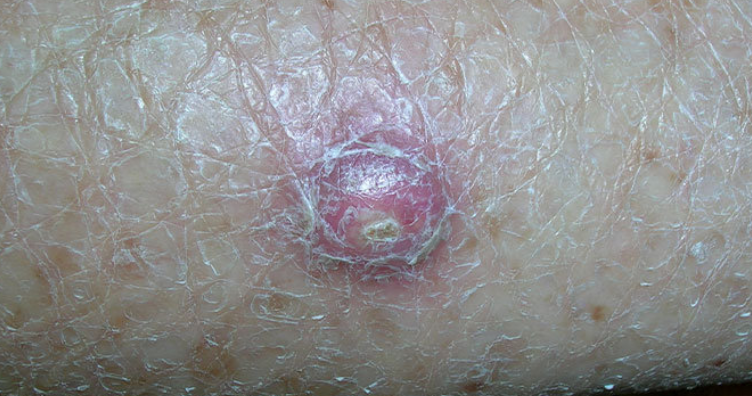
Skin Cancer
Skin cancer develops in your thyroid gland, a part of your endocrine system. Your thyroid gland produces hormones that regulate body temperature, heart rate and metabolism. Most thyroid cancers are highly curable. Treatments include surgery, chemotherapy, radiation, hormone therapy and radioiodine therapy.
Skin cancer occurs when abnormal skin cells grow uncontrollably, often due to prolonged exposure to ultraviolet (UV) radiation from the sun or tanning beds.
It can appear as new growths or changes in existing moles or spots. Early diagnosis is key to successful outcomes.
Skin Cancer Treatment in Malakpet includes surgical removal, cryotherapy, radiation, and topical or systemic medications, depending on the type and stage of the cancer.
Overview
What is Skin cancer?
Skin cancer occurs when mutations develop in the DNA of skin cells, causing them to grow uncontrollably. These abnormal cells can form malignant tumors, potentially spreading to other parts of the body if not detected early.
How common is skin cancer?
Skin cancer is the most common form of cancer globally. In the United States alone, over 5 million cases are diagnosed each year. The good news is that when detected early, most types of skin cancer are highly treatable.

What are the types of skin cancer?
- Basal Cell Carcinoma (BCC): The most common and least dangerous. It rarely spreads but should still be treated early.
- Squamous Cell Carcinoma (SCC): More likely to spread than BCC. Appears as a scaly red patch or sore.
- Melanoma: The most serious form. It can spread rapidly to internal organs if not treated early.
What are the signs of skin cancer?
Warning signs include:
- New growths or sores that don't heal
- Changes in existing moles (size, shape, color)
- Itchy or bleeding spots
How is skin cancer diagnosed?
Your doctor may perform a skin exam and a biopsy to check for cancerous cells. In some cases, additional imaging tests are needed to check if the cancer has spread.
How is skin cancer treated?
- Surgery: Removal of the cancerous tissue is the most common treatment.
- Cryotherapy: Freezing cancer cells with liquid nitrogen.
- Topical medications: Applied directly to the skin to destroy abnormal cells.
- Radiation therapy or chemotherapy: Used for advanced cases or when surgery isn't possible.
What are the signs that thyroid cancer has spread?
If you have thyroid cancer that has spread (metastasized) to other areas of your body, you may experience symptoms such as:
- Tiredness.
- Loss of appetite.
- Nausea and vomiting.
- Unexpected weight loss.
What causes thyroid cancer?
Experts aren’t sure why some cells become cancerous (malignant) and attack your thyroid. Certain factors, such as radiation exposure, a diet low in iodine, and faulty genes can increase risk. Other risk factors include:
- Enlarged thyroid (goiter).
- Family history of thyroid disease or thyroid cancer.
- Thyroiditis (inflammation of your thyroid gland).
- Gene mutations (changes) that cause endocrine diseases, such as multiple endocrine neoplasia type 2A (MEN2A) or type 2B (MEN2B) syndrome.
- Low iodine intake.
- Obesity (high body mass index).
- Radiation therapy for head and neck cancer, especially during childhood.
- Exposure to radioactive fallout from nuclear weapons or a power plant accident.
Diagnosis and Tests
How is thyroid cancer diagnosed?
If you have an enlarged thyroid nodule or other signs of thyroid cancer, your healthcare provider may order one or more of these tests:
- Blood tests: A thyroid blood test checks hormone levels and gauges whether your thyroid is functioning properly.
- Biopsy: During a fine-needle aspiration biopsy, your healthcare provider removes cells from your thyroid to test for cancer cells. A sentinel node biopsy can determine if cancer cells have spread to lymph nodes. Your provider may use ultrasound technology to guide these biopsy procedures.
- Radioiodine scan: This test can detect thyroid cancer and determine if cancer has spread. You swallow a pill containing a safe amount of radioactive iodine (radioiodine). Over a few hours, your thyroid gland absorbs the iodine. Your healthcare provider uses a special device to measure the amount of radiation in the gland. Areas with less radioactivity need more testing to confirm the presence of cancer.
- Imaging scans: Radioactive iodine scan, computed tomography (CT) and positron emission tomography (PET) scans can detect thyroid cancer and cancer spread.
Can skin cancer be prevented?
- Use sunscreen with SPF 30 or higher daily
- Wear protective clothing and hats
- Avoid tanning beds
- Regularly check your skin for changes
Risk Factors
Several factors can increase your risk of developing skin cancer:
- Excessive sun exposure: Especially without sunscreen protection.
- Fair skin: Less melanin means less natural protection from UV rays.
- History of sunburns: Even one blistering burn can increase your risk.
- Family or personal history of skin cancer
- Use of tanning beds
- Weakened immune system
Prevention Tips
Protect your skin and reduce your risk of skin cancer with these tips:
- Wear sunscreen daily, even on cloudy days.
- Reapply sunscreen every 2 hours or after swimming/sweating.
- Wear wide-brimmed hats and UV-blocking sunglasses.
- Stay in the shade between 10 AM and 4 PM.
- Avoid tanning beds and sunlamps.
ABCDEs of Melanoma
Use the ABCDE rule to help recognize signs of melanoma:
- A - Asymmetry: One half doesn't match the other.
- B - Border: Edges are irregular, ragged, or blurred.
- C - Color: Uneven colors like black, brown, pink, or white.
- D - Diameter: Larger than 6mm (about the size of a pencil eraser).
- E - Evolving: Changes in size, shape, color, or new symptoms like bleeding or itching.
When to See a Doctor
Contact a healthcare provider if you notice:
- A new growth or mole that looks unusual
- Changes in an existing mole or lesion
- Sores that don’t heal
- Itching, bleeding, or pain in a mole
Early detection greatly increases the chance of successful treatment.
Explore More : Testicular Cancer Treatment in Malakpet